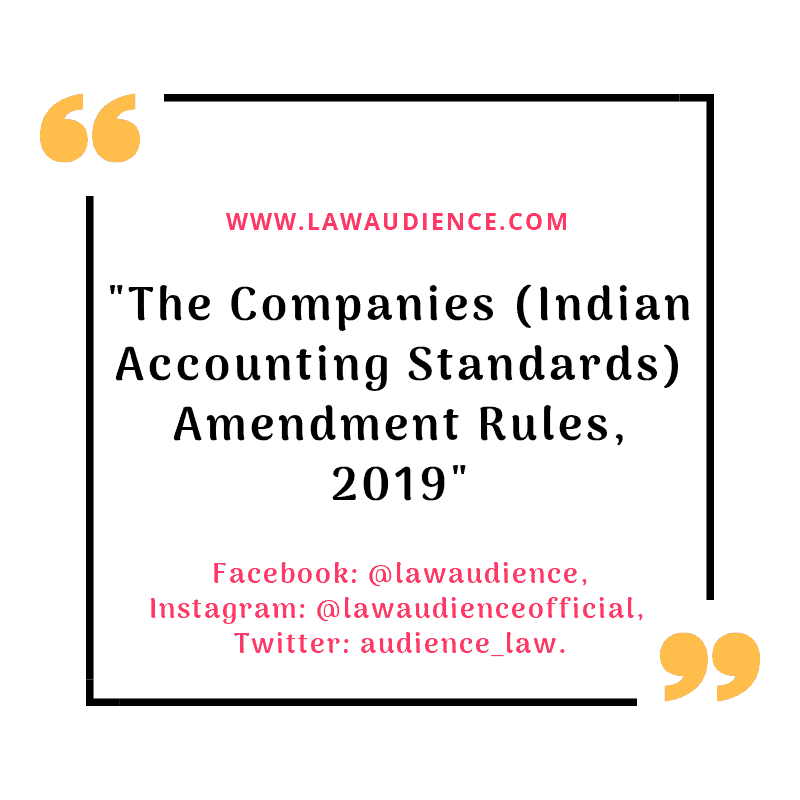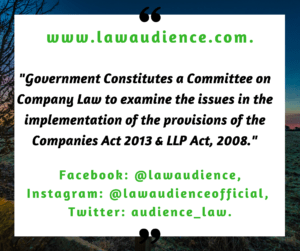The Companies (Indian Accounting Standards) Amendment Rules, 2019.
G.S.R. 273(E): In exercise of the powers conferred by section 133 read with section 469 of the Companies Act, 2013 (18 of 2013), the Central Government, in consultation with the National Financial Reporting Authority, hereby makes the following rules further to amend the Companies (Indian Accounting Standards) Rules, 2015, namely:
1. Short title and commencement: (1) These rules may be called the Companies (Indian Accounting Standards) Amendment Rules, 2019.
(2) They shall come into force on 1st day of April, 2019.
In the Companies (Indian Accounting Standards) Rules, 2015 (hereinafter referred to as the principal rules), in the “Annexure”, under the heading “B. Indian Accounting Standards (Ind AS)”:
I. in “Indian Accounting Standard (Ind AS) 101”, –
(i) for paragraph 30, the following paragraph shall be substituted, namely:-
“30 If an entity uses fair value in its opening Ind AS Balance Sheet as deemed cost for an item of property, plant and equipment, an intangible asset or a right-of-use asset (see paragraphs D5 and D7), the entity’s first Ind AS financial statements shall disclose, for each line item in the opening Ind AS Balance Sheet:
(a) the aggregate of those fair values; and
(b) the aggregate adjustment to the carrying amounts reported under previous GAAP.”;
(ii) for paragraph 39AB, the following paragraph shall be substituted, namely:-
“39AB Ind AS 116, Leases, amended paragraphs 30, C4, D1, D7, D8B, D9 and D9AA, deleted paragraph D9A and added paragraphs D9B–D9E. An entity shall apply those amendments when it applies Ind AS 116.”
(iii) in Appendix C, in paragraph C4, for item (f), the following item shall be substituted, namely:-
“(f) If an asset acquired, or liability assumed, in a past business combination was not recognised in accordance with previous GAAP, it does not have a deemed cost of zero in the opening Ind ASBalance Sheet. Instead, the acquirer shall recognise and measure it in its Consolidated Balance Sheet on
the basis that Ind ASs would require in the Balance Sheet of the acquiree. To illustrate: if the acquirer had not, in accordance with its previous GAAP, capitalised leases acquired in a past business combination in which acquiree was a lessee, it shall capitalise those leases in its consolidated financial statements, as Ind AS 116, Leases, would require the acquiree to do in its Ind AS Balance Sheet. Similarly, if the acquirer had not, in accordance with its previous GAAP, recognised a contingent liability that still exists at the date of transition to Ind ASs, the acquirer shall recognise that contingent liability at that date unless Ind AS 37, Provisions, Contingent Liabilities and Contingent Assets, would prohibit its recognition in the financial statements of the acquiree. Conversely, if an asset or liability was subsumed in goodwill/capital reserve in accordance with the previous GAAP but would have been recognised separately under Ind AS 103, that asset or liability remains in goodwill/capital reserve unless Ind ASs would require its recognition in the financial statements of the acquiree.”;
(iv) In Appendix D,
(a) in paragraph D1, for item (d), the following item shall be substituted, namely:-
“(d) leases (paragraphs D9, D9AA and D9B-D9E);”
(c) for paragraph D8B, the following paragraph shall be substituted, namely:-
“D8B Some entities hold items of property, plant and equipment, right-of-use assets or intangible assets that are used, or were previously used, in operations subject to rate regulation. The carrying amount of such items might include amounts that were determined under the previous GAAP but do not qualify for capitalisation in accordance with Ind ASs. If this is the case, a first-time adopter may elect to use the previous GAAP carrying amount of such an item at the date of transition to Ind Ass as deemed cost. If an entity applies this exemption to an item, it need not apply it to all items. At the date of transition to Ind ASs, an entity shall test for impairment in accordance with Ind AS 36 each item for which this exemption is used. For the purposes of this paragraph, operations are subject to rate regulation if they are governed by a framework for establishing the prices that can be charged to customers for goods or services and that framework is subject to oversight and/or approval by a rate regulator (as defined in Ind AS 114, Regulatory Deferral Accounts).”;
CLICK HERE TO DOWNLOAD THE COMPANIES (INDIAN ACCOUNTING STANDARDS) AMENDMENT RULES, 2019:



